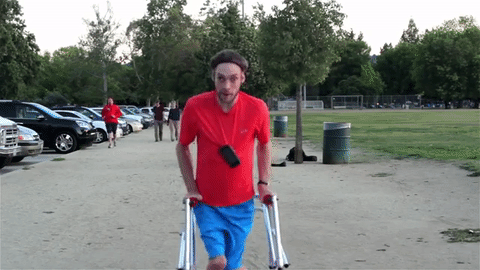Zach Anner is an Austin-based comedian with cerebral palsy who has worked as a television star, speaker and writer. The Badger Herald was able to chat with Anner about his background, comedy and disability before his speaking event Tuesday with University of Wisconsin’s Best Buddies chapter, an organization dedicated to the inclusion of those with disabilities.
This interview has been edited for style and clarity.
The Badger Herald: To start off, for those who aren’t familiar with your work, could you give some background as to what you do?
Zach Anner: I’m a Youtuber and comedian with cerebral palsy. I got my first taste of notoriety in 2010 when I auditioned to win a show from Oprah Winfrey. Then, I hosted a show on the Oprah Winfrey Network called “Rollin’ with Zach,” which was a travel show for people who never thought they could travel. After that, I hosted another travel show with Google and Reddit called “Riding Shotgun,” where we asked the Internet where to go and what to do. We went on a 5,000 mile road trip across the country doing only things the Internet had suggested.
Then, I went on to host a show called “Have a Little Faith” with Rainn Wilson’s media company SoulPancake, where I explored religions. I also host a Youtube series called “Workout Wednesdays,” where I do all sorts of crazy things like running on treadmills and riding mechanical bulls. I’m also the author of a book called “If at Birth You Don’t Succeed,” where I basically put every embarrassing thing that’s happened to me in a book. That pretty much does the job.
BH: So as you said firstly, you are a comedian. Could you describe what importance comedy has had throughout your life?
ZA: Comedy is everything. Comedy makes even the most painful struggle easier to deal with, because no matter what you’re going through you tend to think of [that struggle] in terms of stories you want to tell your friends. Comedy is the thing that gives context to struggle.
When I was growing up, my house would always listen to stand-up comedians, and that was sort of what we all had in common — that great sense of humor. I realized, as I got older, because I had the disability and the wheelchair and everything, that the chair could be used as a tool to actually help people have conversations they may not be comfortable having otherwise.
Me being a goofball has allowed me to do good work and actually have a positive impact.
BH: How long have been doing speaking events, at college campuses or otherwise, and what is your motivation for doing so?
ZA: I’ve been doing events for about five years now, and I guess I just love meeting people. I feel that students at college campuses are so eager to engage and ask questions. I also just love getting free dorm food. So any time I can go into a cafeteria and get pizza I’ll take it.
BH: You know what? No one can fault you for that. Could you touch on any projects you have in the works? Basically, what is next for Zach Anner?
ZA: Right now I’m hosting a show called “Top of the Monday” on SoulPancake, which is a news show that’s all good news that we release every Monday morning. There’s so much negativity in our culture right now, I want to put some positive, fun stuff out there. I’ve got some pretty awesome “Workout Wednesdays” planned, and I’m going to be touring and traveling a lot over the next few months. I’m really excited about doing that sort of stuff.
Going everywhere with the book has been nuts, and hopefully I can meet as many people as possible and make as many videos. I’m always going to be making stuff, so I can’t even tell you what’s next [after that] because I’m not even sure.
BH: How much do you try to define your disability versus how much other people’s definitions enter the equation?
ZA: For me, disability is not what really defines me. It definitely is, kind of, my being and a tool that I use to speak to the deeper messages and issues that I want to talk about. And, definitely, if I can use humor through disability to change people’s perceptions, it’s what I want to do.
But I think it’s very, very personal. People will try to tell you there’s a politically correct way to talk about disability or deal with it and don’t say these specific terms. But my whole thing is if it’s coming from a good place and it helps build an empathy for us to talk about disability in a more open and humorous way, then that’s what I’m about.
Certain people would disagree with me, but I speak to my own experience and the people I’ve met. I think there’s no way to say every disabled person has a similar experience, because my experiences are funneled through my perceptions and my attitude.
I think there’s a faulty thinking out there that because I have cerebral palsy, my struggles are worse or harder than anyone else’s. But I’ve always taken the position that we’re all going through something, but my struggles are easy to see because they’re all physical. I tend to see a lot of similarities and feel a lot of empathy for anyone going through any type of struggle.
That’s how I tend to look at humanity, we all have some sort of disability — apparent, or not.


